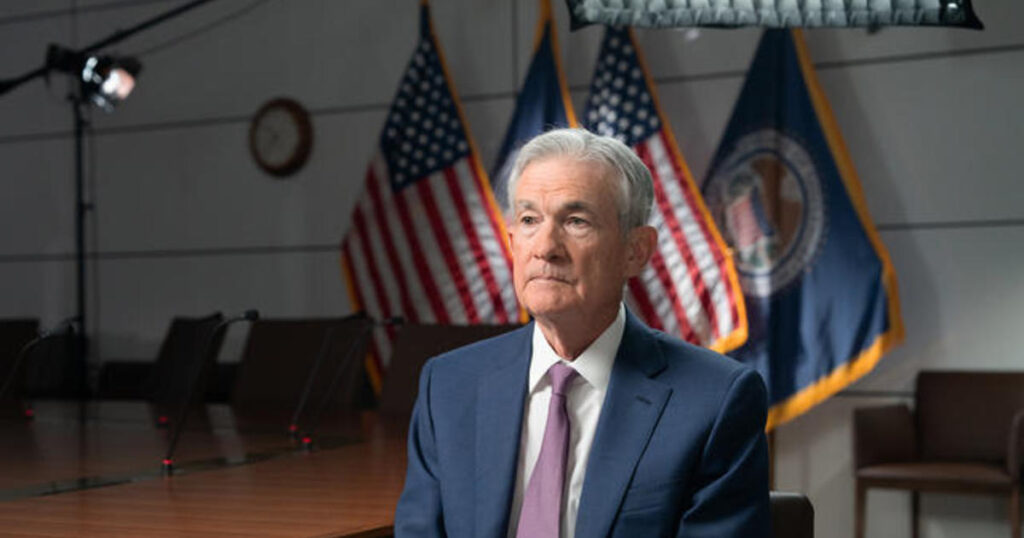This week on 60 Minutes, Scott Pelley had a conversation with Jerome Powell, the chairman of the Federal Reserve, on the current status of the American economy following the Fed’s 11 rate hikes this week in an attempt to calm the economy following 40 years of record high inflation.
Employment is almost at a 50-year high, and inflation has been gradually declining over the last 11 months. Powell declared last week that the Federal Reserve will maintain the federal interest rate at 5.25 to 5.50% for the time being, in spite of those tendencies. Powell, however, stated to 60 Minutes that he anticipates a rate decrease this year.
In the Federal Reserve Board Room, he told 60 Minutes correspondent Scott Pelley, “Our confidence is rising.” The majority of the 19 individuals seated around this table think that, in the most likely scenario, it will be appropriate for us to lower the federal funds rate this year.
In addition, Chair Powell talked on new rules aimed at averting bank failures such as Silicon Valley Bank, the Federal Reserve’s investigation into the effects of artificial intelligence on the economy, and the demise of China Evergrande, the highly leveraged Chinese real estate company.
Cybersecurity
Powell was questioned by Scott Pelley over the possibility of cyberattacks against the US financial sector. Powell stated that the Fed may assist banks in achieving this objective since effective defense requires continuous financing and attention to stay aware of emerging threats.
He clarified that as attackers are constantly raising their game, defenders must also constantly do the same. You must continue making investments in order to advance or stay current. That will never end.
Failure of Silicon Valley Bank
Silicon Valley Bank abruptly closed its doors in March 2023 following the hours-long withdrawal of billions of dollars by customers. It was a traditional bank run, but social media and mobile banking gave it more impetus. Powell stated that in order to avoid a repeat of the SVB incident, the Fed needs to improve its supervision of banks and is already developing regulatory measures.
They have dedicated a great deal of effort to figuring out how to adjust regulations to the current environment, where bank runs can occur far more quickly than they might have even two decades ago, the chairman said.
China’s economy and Evergrande
China Evergrande, the country’s once-dominant real estate company, was ordered to be liquidated this month by a Hong Kong court after it was unable to restructure $300 billion in debt owed to bondholders and banks. Of such debt, $25.4 billion was owing to creditors abroad. Deep debt also accompanies a large number of other Chinese real estate firms.
Needless to say, Powell informed Pelley, China’s economy is currently facing some difficulties. It’s still far too closely linked to investing in real estate and similar activities. Powell stated that although the United States buys manufactured goods from China, it is not currently financially integrated enough to experience significant shocks. According to him, we might see some minor inconveniences as long as the events in China don’t cause more serious ones.
The global economy and war
Pelley enquired as to Powell’s assessment of the biggest danger facing the global economy. According to him, the biggest threat to stability is “geopolitical risks,” such as the conflicts in the Middle East and Ukraine.
As of the now, according to Chair Powell, the United States is not particularly affected by the conflict in Ukraine or the shipping delays in the Red Sea brought on by Houthi missiles fired from Yemen. These disagreements might get worse and have an effect on the US economy. Do such risks develop into something that is genuinely a significant economic issue will be the question. That, he argued, has not yet occurred.
It might be the cost of oil. That might just be the result of the conflict getting worse and the damage it would do to public trust. Still, we haven’t seen that yet. There’s a risk. We are aware of the risk, which is genuine.
Jobs and immigration
Powell said that there was an acute labor shortage in the American economy as a result of millions of Americans quitting their jobs during the pandemic. The Fed had anticipated that many of them would reenter the workforce by 2022, he said, but that did not occur.
However, he said that in 2023, a return to pre-pandemic levels of immigration combined with a rise in workers in prime age resulted in a notable boost in the labor supply. Powell informed Pelley that those contributed significantly to the stabilization of the job market. Powell was eager to highlight the beneficial impact immigration played in this situation even though he stressed that the Fed doesn’t determine or comment on immigration policy.
Immigration has improved the American economy, according to Powell. And, to be honest, in the last year alone, immigration has returned to levels more typical of the pre-pandemic period, which has played a significant role in the labor market’s story of regaining greater equilibrium.
Artificial intelligence research
Powell was followed by 60 Minutes cameras to Spelman College in Atlanta, Georgia, in December. There, he spoke with students and addressed their inquiries regarding the activities of the Federal Reserve. He hosted a tech roundtable with minority business owners as well. Pelley questioned Powell there about the type of artificial intelligence study the Fed has been conducting to determine how it will affect the US economy.
In the near future, the question is: “Will artificial intelligence…replace workers or enable and enhance employment, making workers more productive and hence paid better?” Will it do a combination of both? He clarified.
According to the chairman, the Fed is also interested in understanding more about the long-term effects of artificial intelligence on the economy. What impact will it have on employment, productivity, and the distribution of income and wealth? These are the things that are on our minds.








